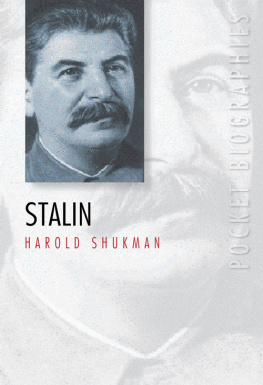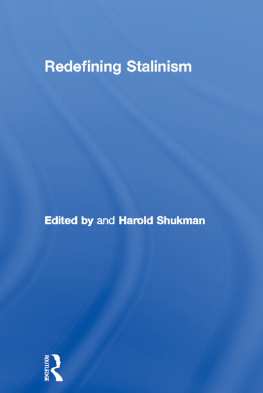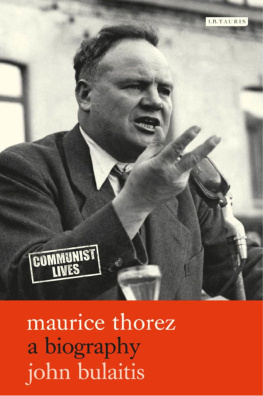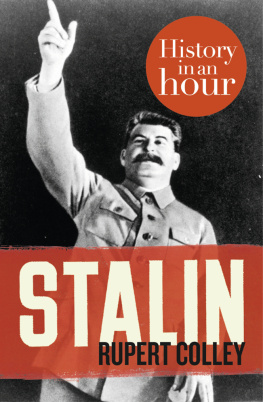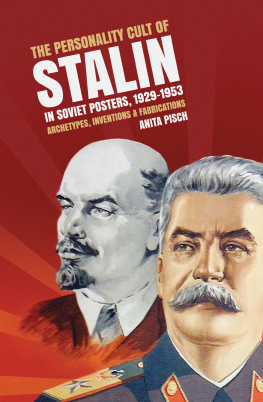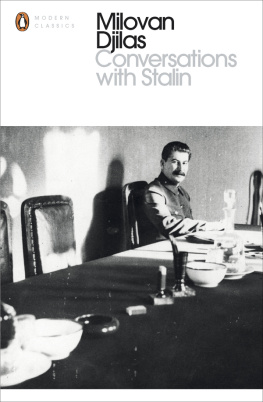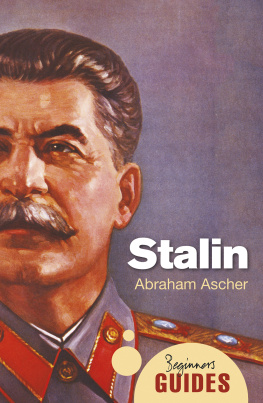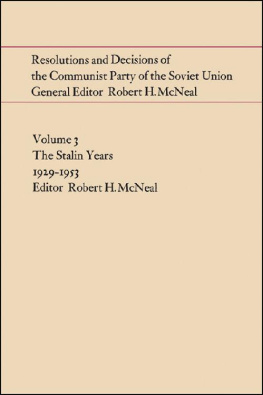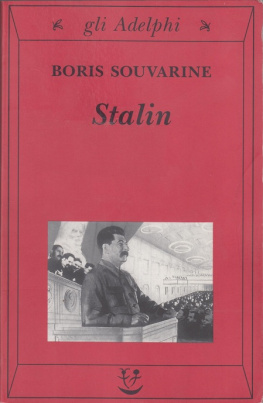Shukman - Stalin
Here you can read online Shukman - Stalin full text of the book (entire story) in english for free. Download pdf and epub, get meaning, cover and reviews about this ebook. City: Soviet Union, year: 2011, publisher: The History Press, genre: Politics. Description of the work, (preface) as well as reviews are available. Best literature library LitArk.com created for fans of good reading and offers a wide selection of genres:
Romance novel
Science fiction
Adventure
Detective
Science
History
Home and family
Prose
Art
Politics
Computer
Non-fiction
Religion
Business
Children
Humor
Choose a favorite category and find really read worthwhile books. Enjoy immersion in the world of imagination, feel the emotions of the characters or learn something new for yourself, make an fascinating discovery.
Stalin: summary, description and annotation
We offer to read an annotation, description, summary or preface (depends on what the author of the book "Stalin" wrote himself). If you haven't found the necessary information about the book — write in the comments, we will try to find it.
Stalin — read online for free the complete book (whole text) full work
Below is the text of the book, divided by pages. System saving the place of the last page read, allows you to conveniently read the book "Stalin" online for free, without having to search again every time where you left off. Put a bookmark, and you can go to the page where you finished reading at any time.
Font size:
Interval:
Bookmark:
Bibliography
Bullock, Alan. Hitler and Stalin; Parallel Lives, London, HarperCollins, 1991
Chuev, Feliks. Molotov Remembers (edited with introduction and notes by Albert Resis), Chicago, Ivan. R. Dee, 1993
Churchill, W. History of the Second World War, London, Cassell, 1951, vol. 4
Deutscher, Isaac. The Prophet Armed. Trotsky: 18791921, London, Oxford University Press, 1954
, The Prophet Outcast: Trotsky, 192940, London, Oxford University Press, 1963
Kvashonkin, A.V., et al. Bolshevistskoe rukovodstvo: perepiska, 19121927, Moscow, Rosspen, 1996
Lih, Lars T., et al (eds). Stalins Letters to Molotov (translated by Catherine A. Fitzpatrick), New Haven, CT and London, Yale University Press, 1995
Medvedev, Roy. Let History Judge (revised and expanded edition, edited and translated by George Shriver), Oxford, Oxford University Press, 1989
, O Staline i stalinizme, Moscow, 1990
Radzinsky, Edvard. Stalin, London, Sceptre, 1996
Rogovin, Vadim Z. 1937: Stalins Year of Terror, Oak Park, Missouri, Mehring Books, 1998
Russia No. 1 (1921): Report (Political and Economic) of the Committee to Collect Information on Russia, London, HMSO, 1921
Shub, David. Lenin: A Biography, Garden City, New York, Doubleday, 1948
Trotsky, Leon. Stalin: An Appraisal of the Man and His Influence (edited and translated by Charles Malamuth), New York, Grosset & Dunlap Universal Library, 1941
Vaksberg, Arkady. Stalin Against the Jews (translated by Antonia Bouis), New York, Vintage Books, 1994
Volkogonov, Dmitri. The Rise and Fall of the Soviet Empire (translated and edited by Harold Shukman), London, HarperCollins, 1998
. Stalin: Triumph and Tragedy (translated and edited by Harold Shukman), London, Weidenfeld & Nicolson, 1991
. Trotsky; The Eternal Revolutionary (translated and edited by Harold Shukman), London, HarperCollins, 1996
Wolfe, Bertram D. Three Who Made a Revolution, New York, Dial Press, 1948
One
I NTRODUCTION
I kiss you on the nose, Eskimo-fashion. Dammit! I miss you something awful. I miss you like hell, I swear. I have no one, not a soul to have a proper talk with, damn you. Is there really no way for you to come to Cracow?1 In December 1912, Stalin wrote to his party comrade Lev Kamenev, then in Geneva, in this jocular tone, very much as one Russian intellectual might write to another. Twenty-four years later, he would stage-manage Kamenevs trial as a Fascist spy and have him shot like a dog.
In 1912, Stalin was regarded by his comrades as an audacious revolutionary and an affable comrade indeed, Lenin described him as a wonderful Georgian. By the 1930s, he had become a homicidal monster whose thirst for their blood seemed insatiable. When, in the late 1940s, for his own twisted purposes, he masterminded the arrest and in some cases the execution of the wives of some of his closest and longest-serving accomplices, the omnipotent dictator would sadistically respond to their pleas for mercy: It doesnt depend on me. I can do nothing. Only the NKVD [secret police] can sort it out.2
What had wrought this transformation? How had a provincial, comparatively insignificant member of a small, unsuccessful group of journalists and persecuted political conspirators which the Bolsheviks mostly were before the First World War become one of the most powerful and merciless dictators in history, a dictator whose name and image would saturate every field of Soviet endeavour? How did that image evolve from the grey blur depicted by one of the closest observers of 1917, and the outstanding mediocrity, as the revolutions most vivid personality called him, into a demigod, an icon worshipped by his own subjects, as well as by an international movement that included many educated and thoughtful people abroad?
Under Stalins rule, what had been the Russian Empire was transformed no less spectacularly. When Lenin died in 1924 and Stalin took over the reins of power, the Soviet Union had barely begun to recover from the successive ravages of the First World War, the Civil War and the economic failures of the new regime. Both the industry and the agriculture of this predominantly agrarian country had been reduced to a shadow of their former scale. Yet by 1939 the Soviet Union was an industrial and military power of formidable strength. Driven in 1941 by Hitlers armies into its own heartland, by 1943 the Red Army turned the war around and by the spring of 1945 was sharing Europe with its Western Allies. Under Stalins rule the USSR, a pre-war pariah among nations, took its place on the United Nations Security Council as the leader of the socialist camp in a world that was soon to be divided by the Cold War.
As a member of the Politburo from 1917 and as its head from 1924, Stalin can be said to have been in power for thirty-six years, from the time of the revolution until his death in 1953. And since he left no personal diary that we know of the story of his life is inevitably and inextricably linked to the history of the period. It is the purpose of this brief account to examine these parallel transformations Stalins and the Soviet Unions and to see how they are interrelated.
Two
B EGINNINGS
The Early Years
S talins birthday has always been given as 9/21 December 1879. The local archives now reveal that he was in fact born on 6/18 December 1878, a year earlier. There is no explanation for this discrepancy. His birthplace was Gori, a small town of some 12,000 inhabitants of mixed Caucasian origin, in the Georgian province of Tiflis (Tblisi), and close to the Borzhom source of mineral water that would remain Stalins digestive of choice until the end of his life. Named Iosif (Joseph) and known by the Georgian diminutive of Soso, he was the third son of Vissarion (Beso) Dzhugashvili and Yekaterina (Keke), ne Geladze. Two infant children had died before Soso arrived.
His father, Beso, was one of the small towns ninety-two cobblers, among the lowest ranking trades in the hierarchy of artisanry, the topmost being that of watchmaker. His brutishness, poverty and frustration made Beso a violent, drunken husband and father; his wife, a pious Christian, was a hard-working laundry-woman and seamstress. She was dedicated to her only child and determined that he should rise above his origins and, ideally, become a priest in the Orthodox Church. Violence and discord in the family home eventually led to the parents separation and Beso ended up dying either in a Tiflis doss-house or after being knifed in a brawl. He was buried as a pauper.
A Georgian-speaker until the age of eleven he would never lose the distinctive accent thanks to his mothers efforts and the help of a sympathetic patron Soso entered the church school in Gori in 1888. In 1894, having graduated with top marks, he was admitted to the Tiflis Seminary to train as a priest. Here he showed talent and a phenomenal memory for Biblical texts. Here also it was that, like so many other young people throughout the empire, he was swept up by the tide of discontent and rebellion that characterized Russia at the turn of the century. Peasants were rioting for more land; workers were striking for better conditions; students were demonstrating for their curricula to be liberalized; intellectuals were demanding political reform that would give society a voice in government; senior officials were being assassinated; anarchists were throwing bombs; Social Democrats were setting up clandestine organizations to bring the message of socialist revolution to the proletariat.
Soso and his fellow seminarists were ripe for conversion to the new political creed. The lack of intellectual stimulation in their studies and the drab harshness of seminary life made them vulnerable to the political ferment that was stirring in Russia, let alone the excitement of the colourful Georgian capital. While still playing the diligent theological student in class, Soso was reading Marx and Darwin. He became an atheist and began associating with underground, i.e. clandestine, revolutionary circles.
Next pageFont size:
Interval:
Bookmark:
Similar books «Stalin»
Look at similar books to Stalin. We have selected literature similar in name and meaning in the hope of providing readers with more options to find new, interesting, not yet read works.
Discussion, reviews of the book Stalin and just readers' own opinions. Leave your comments, write what you think about the work, its meaning or the main characters. Specify what exactly you liked and what you didn't like, and why you think so.

